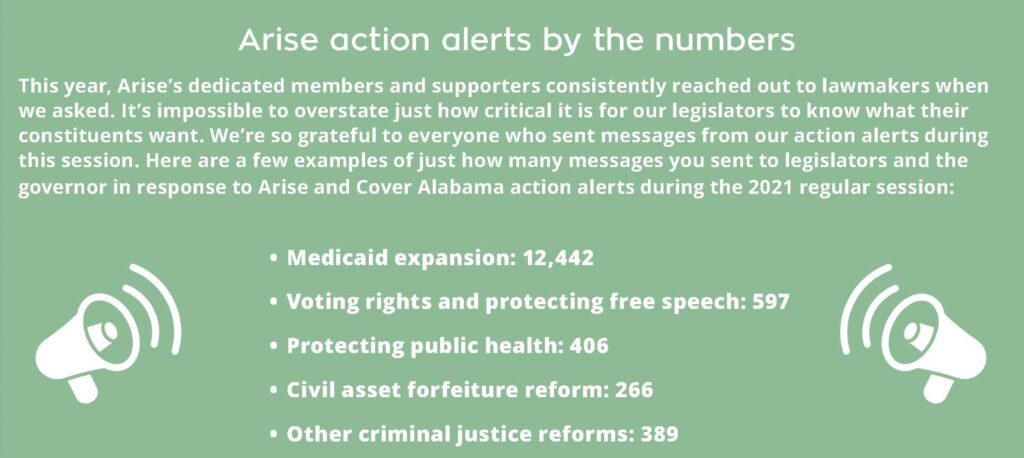The Alabama Legislature’s 2021 regular session has been a difficult one, to say the least. Public access remains limited, and lawmakers have advanced some of the most damaging bills in years. And many legislators have forced attention onto high-profile, controversial bills to foment conflict and remove focus from priorities that would benefit all Alabamians. But even so, together we have opportunities to create significant positive change in the session’s waning days.
Legislators have advanced bills to increase penalties for violation of the monuments bill passed three years ago. This law prohibits removal of monuments to slavery and oppression erected primarily to symbolize Jim Crow policies and intimidate advocates for civil rights for Black people in the 1950s and ‘60s. At the same time, the Legislature has halted movement on HB 8 by Rep. Juandalynn Givan, D-Birmingham, which would repeal the existing bill’s ban on removing Confederate monuments.
The legacy of oppression enshrined in these monuments to long-dead traitors continues even now. The House this year passed HB 445 by Rep. Allen Treadaway, R-Morris. This anti-protest bill would have seen Dr. Martin Luther King Jr. and Rev. Fred Shuttlesworth charged and imprisoned for organizing marches. And much of the rhetoric supporting this bill was copied straight from Bull Connor’s playbook. This included supporters’ proclamations that the bill would secure law and order and accusations that “outside agitators” were behind protests.
Lawmakers act swiftly on voting restrictions, corporate lawsuit protections
Bills to restrict Alabamians’ voting rights also have advanced this year. These include bans on curbside voting that would prevent legally required and morally necessary reasonable accommodations for people with disabilities and older Alabamians.
These harmful high-profile bills have not distracted from another legislative priority: protecting businesses that have harmed people. Early in the session, lawmakers fast-tracked SB 30 by Sen. Arthur Orr, R-Decatur. This bill provided broad corporate immunity from lawsuits related to coronavirus exposure or contraction of COVID-19.
The news isn’t all bad, though. Even with the Legislature’s deprioritization and blocking of reform bills, some substantial reforms still have been advancing. And several good bills are in position to become law before the session’s end.
Progress on sentencing reform, ending license suspensions
HB 129 by Rep. Chris Pringle, R-Mobile, would end the practice of suspending driver’s licenses for nonpayment of fines and fees. This practice is cruel and counterproductive. Forcing people to break the law to drive to work and see to their basic needs shows a misguided belief that punishment is the answer to poverty. This bill has been the subject of much discussion in the House Judiciary Committee, where Pringle has gathered considerable support for this needed reform.
Next, HB 107 by Rep. Chris England, D-Tuscaloosa, would repeal the state’s archaic, broken Habitual Felony Offender Act (HFOA). Like all mandatory minimum laws, the HFOA creates harsh punishment out of a mistaken belief that keeping people locked up longer for crimes that don’t warrant long sentences, even under Alabama’s heavily punitive sentencing standards, makes communities safer.
In reality, the HFOA keeps people locked up long after they are unlikely to reoffend, both because they have worked hard to gain education and skills that make repeat offenses unlikely or because they have “aged out” of criminality. Statistics show 70-year-olds rarely commit crimes, yet the state has many older adults locked away on the bad reasoning that they pose a danger to the community. HB 107 has passed the House Judiciary Committee over opposition and is in position to pass the full House.
Community corrections expansion on the verge of passage
While HB 129 and HB 107 face significant opposition that has slowed their movement, other sentencing reforms have advanced further and are in good position to become law. HB 24 by Rep. Jim Hill, R-Odenville, would allow people convicted under the HFOA to petition for resentencing if they would be sentenced under the state’s less severe sentencing guidelines today.
Hill’s HB 73 would create community corrections programs in every judicial circuit. The bill would create community corrections programs for each judicial circuit in Alabama. These programs allow people to serve sentences in their communities. This approach reduces repeat offenses by allowing people to maintain support structures as they rebuild their lives. These programs are also smart budgetary decisions, reducing the state’s supervision costs and reducing horrific overcrowding in the state’s prisons.
HB 73 would go a long way toward allowing Alabamians to rebuild their lives after a conviction. And importantly, it’s just one step from final passage in the Legislature. With just a few legislative days remaining, HB 73 is in excellent position to become law. Email your senator today and ask them to support HB 73 on the Senate floor.
New limits on civil asset forfeiture within reach
Alternative courts aren’t the only area where substantial progress has occurred in passing criminal justice reforms. HB 394 by Rep. Andrew Sorrell, R-Muscle Shoals, would rein in the abusive practices of civil asset forfeiture. This tactic often is used to take people’s personal property without a criminal conviction ‒ or even a charge. (SB 210 by Orr is the Senate version.) Alabama doesn’t report racial data on forfeitures, but research in other states has shown they are disproportionately used against Black people.
Far from the supposed “drug kingpin” justification for civil asset forfeiture, this practice is used heavily in Alabama to seize small amounts of cash and property. Because these seizures are classified as civil actions, forfeiture victims are not provided attorneys. Often, the amounts seized are less than the fee that an attorney would charge to fight the seizure.
HB 394 would rein in some of the worst abuses of civil asset forfeiture. Alabamians deserve to have their personal property protected from seizure when they haven’t been convicted of a crime. But under our state’s civil asset forfeiture policies, people can lose their property, including their home or their only vehicle, without being convicted – or even charged. And law enforcement has an incentive to seize property because agencies are often allowed to keep the property they take.
The Senate passed SB 210 just this week. And HB 394 has cleared the House Judiciary Committee. If the full House votes to pass HB 394, it would go to the governor once the Senate approves a straightforward technical fix to make it identical to SB 210.
HB 394 would increase due process protections for Alabamians who can’t afford to fight to keep the property they own. Email your representative today and ask them to support HB 394’s reforms to civil asset forfeiture.
Your voice can make a difference
Even though the Legislature has spent time this session advancing bills that do nothing to help Alabamians, good opportunities remain to advance reforms that have built momentum during this session. But as time grows short, it’s essential for legislators to hear from constituents urging them to advance legislation to help Alabamians.
With your help, we can help push these bills across the finish line. With your help, we can make Alabama more equitable, inclusive and just.



